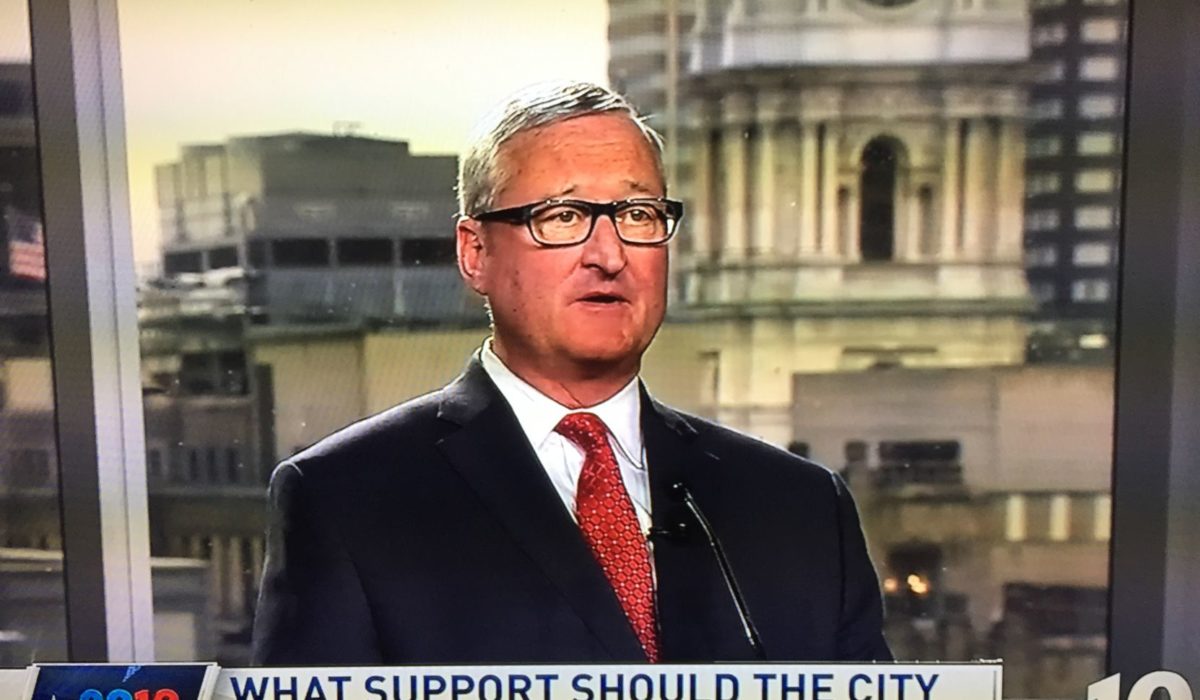In Monday night’s mayoral debate, current Mayor Jim Kenney was all but charisma-less as he faced off against State Sen. Anthony Hardy Williams, who came off looking like the most composed and competent leader, and former City Controller Alan Butkovitz, who kept slinging zingers.
Kenney just had to grin and bear it, red in the face, in part because he has the most money, and because historically an incumbent hasn’t lost in 70 years since two terms were authorized in the Home Rule Charter. Getting through this televised debate inside the Comcast Center seemed to be the price he had to pay, and did not enjoy, for near-certain victory on May 21.
It was the second and final joint appearance for the three Democrats since Kenney has avoided all but the first debate. The winner of the May 21 Democratic primary will run against Republican defense attorney Billy Ciancaglini, who is unopposed.
NBC10 news anchor Jim Rosenfield moderated the debate with panelists Iris Delgado of Telemundo 62 and Sandra Shea, managing editor for opinion at the Philadelphia Inquirer, also fielding questions.
Former Mayor John Street has thrown his support behind Williams, giving this grassroots campaign a boost, one that has raised as of last week $51,098 compared to Kenney’s $703,190 and Butkovitz’s paltry $41,725. But their diminished war chests did not keep Kenney’s opponents from vigorously attacking him during Monday’s debate.
Kenney appeared a bit flustered at times and certainly weaker than his two challengers who are, at least thus far unburdened by the actual job of being mayor.
The set up at the Comcast Center with the three candidates at podiums facing the audience and their questioners looked, and felt, at times, like a round of “Jeopardy” – but not as good-natured.
“We have to stop stop-and-frisk so we can reduce the war between the police and the community,” Butkovitz argued.
Williams agreed, saying, “Just like we did with the opioid crisis, we need to recognize that homicides in Philadelphia are at an epidemic level.” Kenney’s support of the stop-and-frisk policy does not make the city safer but just further divides the community, he said.
Butkovitz advocated identifying people “who are selling guns out of trunks and make it inhospitable in Philadelphia,” funding more job programs and adding more police on the streets. Butkovitz said that safe injection sites, where users could inject drugs under medical supervision, would draw further police manpower away from dealing with the increase in the homicide rate.
Kenney defended himself by arguing that his administration had “marshaled all the departments to deal with this issue [of the increased homicide rate]. We have all the people together, and we’re working to get these numbers down,” he said, adding that “one of the problems is that this state is a crazy gun state,” making it impossible to get any anti-gun legislation passed.
All of this arrived just before Kenney started fumbling and veering into the ridiculous-sounding when he said that his administration is “working on the ground with people with lived experience, people who have been away… to try to convince our young people the error of these ways and that it’s permanent when you’re killed or you kill someone else.”
Williams predictably advocated for eradicating the soda tax, Kenney’s baby, tapping into the $60 million budget surplus to fund about $20 million for 4,000 children to go into pre-K and after-school programs.
“I think the Philadelphia government has more than enough revenue to support after-school programs and pre-K if they believe in it,” Williams said.
“We all know why there’s a soda tax,” Butkovitz chimed in, saying it was revealed “in the federal indictment of John Dougherty. It was a pernicious device to punish the Teamsters and people who held jobs who frankly supported Senator Williams last time and didn’t have the wisdom to get on board with the Kenney machine and John Dougherty.”
Union boss John “Johnny Doc” Dougherty is facing a 116-count federal indictment. The building trade unions, behind the name “Philly 2019,” spent approximately $365,000 in favor of the mayor, while the American Beverage Association spent $521,196 of ads against the mayor’s sweetened beverage tax.
Kenney defended his policy, saying, “I believe this tax is equitable because you don’t have to buy the product,” adding that it has funded programs such as universal pre-K, parks and rec centers, community schools, and libraries.
In terms of lowering the poverty rate, Kenney said, “What we can do is what we are doing, which is investing an unprecedented amount of money in education.”
He added that poverty was a “generational issue, and it’s going to take a while to get it under control,” advocating for a 10 percent reduction in the poverty rate during the next four years.
“How’s he going to decrease it by 10 percent when he hasn’t decreased it by one iota?” Williams rebutted.
Williams’ idea is to employ a cabinet-level position solely dedicated to cutting the poverty rate in half over eight years, partly by working with the private sector to create jobs “that are here and support them” and funding small businesses. “What we will not do is further tax poor people with soda taxes so that frankly they are the ones that stay on the bottom.”
When it came to the discussion of the controversy over supervised injection facilities, Kenney side-stepped questions, refusing to say where such a site would be located, except that it needed to be near where users inject and adding that the city would not operate the sites but that they would be run by a nonprofit.
Currently, a non-profit initiative known as Safehouse is actively working with the city to open the first SIF in the country.
“The city’s role would be to have people there who have access to social services and addiction services and the like so we can get people into another space as opposed to down under a railroad trestle or down by a railroad line shooting up by themselves and dying,” Kenney argued.
Williams said he wouldn’t put a safe injection site in Kensington, that “people come from all sorts of places. You could put it in Rittenhouse Square, and it would be overrun.”
Anti-supervised injection facilities, Williams advocated for “intervention, prevention and aftercare,” without being totally clear on what he meant. He added that people should be able to walk into any fire station, police station, or library in the city and get help finding treatment.
“I’m not sure how you safely inject heroin anyplace in America,” Williams said.
“Mayor Kenney’s statement was classic Jim Kenney,” Butkovitz spat. “He’s both for it and against it at the very same time. Safe injection sites are an oxymoron. There is no way you can safely inject heroin, particularly fentanyl contaminated heroin, without killing yourself at the same time.”
Twitter chatter during and after the debate voted not for any of the three Democrats running as the winner but for Philadelphia Magazine columnist Ernest Owens, who sat in the audience, right behind Rosenfield. It was Owens’ facial expressions and body language to each answer that additionally kept viewers entertained throughout the hour.
TWITTER: @CHARRISBOND





